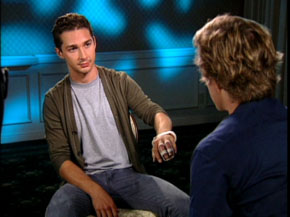Hollywood Psych
The Passion of Shia's Hand
By Sean Collier
June 25, 2009
For those of you fortunate (and wise) enough to thoroughly avoid the ever-growing celebrity gossip industry, let's recap: early on the morning of July 27, 2008, Transformers star Shia LaBeouf was badly injured in a Los Angeles car crash. LaBeouf was drunk at the time of the accident, though it was later determined that he was completely free of blame for the collision. LaBeouf was charged with misdemeanor DUI, but more importantly, his left hand was fairly well crushed. Major reconstructive surgery had to be completed; LaBeouf is still on the mend today.
This accident occurred as Shia was filming Transformers: Revenge of the Fallen, which is currently making a fairly obscene amount of money. Unwilling to use CGI and careful photography to gloss over the injury, director Michael Bay decided to insert the injury into the script. I use the word "insert" because "write" would be too polite; at one point, quite incidentally, Shia's character hurts his hand and screams a bit. Megan Fox, with the precision of a combat medic, quickly dresses the injury, and Shia runs around with a big, glaring bandage for the rest of the film. The injury is shown, but never really discussed.
As a result, we, the audience, who are perfectly aware of Shia's accident last July, think to ourselves, "Oh, right, the DUI thing." It's a jarring breach of reality into an unrealistic movie, and the last thing you want during a film about giant robot truck aliens is the real world knocking at the door. Obviously, this won't affect the box office take of Transformers, which figures to be immense; still, it's a black eye on the film, a reminder that our action hero is a self-professed alcoholic with a badly mangled hand to show for it.
Thanks to the Internet, the facts of filming and lives of the stars are able to intrude more than ever on the public consciousness. When they should've been working on figuring out how to make a movie based on action figures vaguely palatable, Bay and company were instead wondering how to work a dirt-sheet scandal into the plot of their film. Before TMZ and the like, this is the sort of thing that could be avoided; only the truly obsessed would necessarily know about a star's scandals, and on-set drama could be hushed. Now, the public knows all, and must be reckoned with.
This new media intrusion may have actually affected the fate of one would-be blockbuster. Christian Bale's vulgar meltdown on the set of Terminator Salvation garnered more headlines and late-night TV mentions than the film itself; a year later, the sequel performed well below expectations and may have sunk the franchise. This certainly can't be solely attributed to Batman's potty mouth, but serves as a reminder that not all press is good press. The tirade was a distraction from the film itself, and may well have turned off a handful of potential moviegoers.
There's very little for filmmakers to do about incidents like these, other than hope they don't occur and try to spin things when they do. There will always be a source of bad PR, whether it's a ranting star, development problems, or any of a thousand other things that can go wrong between the green light and the premiere. Demeaning to actors though it might be, however, there may be a solution of sorts.
Contracts drawn up between star athletes and sports franchises occasionally will have provisions regarding the player's behavior. Contracts will specify that a player gives up certain rights under the contract if he engages in behavior that puts his physical health or well-being at risk, thus jeopardizing his ability to compete – like if you were to, say, carry a firearm into a nightclub and then accidentally shoot yourself with it.
Occasionally, these clauses are specific – athletes will be prohibited from hunting, riding motorcycles, engaging in other taxing physical competition, certain workout regimens, and so on. I'm not suggesting that studios become this specific with actors ("Ms. Hilton may not go to the club during filming," for example;) that would be demeaning and micromanaging. However, studios should realize that, with stars under more of a microscope than ever, it's in their best interest to at least confront (legally) the possibility that a star could sink the ship. Imagine if Shia had a few more drinks that night, and very much of his own accord got into a serious accident, injuring himself beyond the possibility of continuing to film. He would've utterly derailed the production – and still been owed whatever his contract specified as a kill fee, probably the majority of his pay.
This suggestion isn't delivered as a punishment for those wacky Hollywood stars; it's as a warning to studios. Sooner or later, a tentpole release is going to temporarily or permanently collapse due to some mishap with an actor; such an event could destroy a whole studio. If actors faced losing their meal ticket if they did something stupid, they might think twice. It's punitive – maybe draconian, even – but an unfortunate reality in the face of new media.




